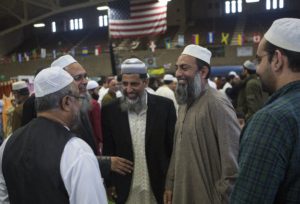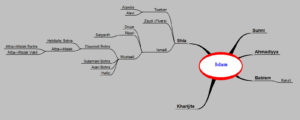Monday after Pentecost 3
The Lord be with you
In volume 79, number 1, of Concordia Theological Quarterly, that came out in 2015, is an article titled “Islam’s Future in America.” It was written by Adam S.Francisco who is Professor and Chair of the History and Political Thought Department at Concordia University Irvine, Irvine, California. A link to the article is provided at the end of this review.
 In this article, Adam Francisco covers the history of Islam in America, beginning with Muslim slaves brought here over two centuries ago and continuing through today. This review even covers the origin of the now politically correct idea that Islam is a “religion of peace” and that the radicals have “hijacked” the religion. In my opinion, no one can have a hope of understanding the present, let alone what might be coming down the road, unless they know and understand history, therefore such a review is important. He then examines current trends in the West from moderates to radicals.
In this article, Adam Francisco covers the history of Islam in America, beginning with Muslim slaves brought here over two centuries ago and continuing through today. This review even covers the origin of the now politically correct idea that Islam is a “religion of peace” and that the radicals have “hijacked” the religion. In my opinion, no one can have a hope of understanding the present, let alone what might be coming down the road, unless they know and understand history, therefore such a review is important. He then examines current trends in the West from moderates to radicals.
In considering the future of Islam in America, Francisco thinks how everything will shake out “is hard to say, but the trends of the past that continue to shape the present will most likely persist into the future.” He also says “We should expect a great bit of diversity amidst Muslims. There will be Twelver, Sevener, Fiver, and every other sort of Shia Muslim alongside Sunnis who are progressivists, secularists, Islamists, and even jihadists. However, the institutions representing American Muslims and public discourse on the character of Islam in America will be predominantly Islamist of one sort or another.”
Francisco goes on to write, “Amidst America’s Muslims there will be and already is a contest for the soul and posture of Islam. Moderates and progressives are already battling with conservatives. This is mostly an internal debate, though it has been suggested non-Muslims should seize any opportunity to promote a moderate Islam.” Francisco, though, points out that others feel that such an effort is doomed to failure and why, at least some of them, so think.
Francisco also warns, “we should expect more of the violence happening across the globe to find its way here.” He reminds us, “For religions committed to a distinction between religion and politics or theology and civil law the first amendment poses little to no problem to the integrity of that religion or the state. For Islam—at least classical orthodox versions of it—it does. Herein lies one of the most basic problems associated with Islam in the West, particularly in a secular and pluralist democracy like America.”
 Francisco ends his article by writing, “Regardless of all the trends, debates, policies, and postures associated with the problems of Islam and its future in America, we can count on the fact that Islam is and will continue to become a part of mainstream American culture. Whether it gets stirred up in the melting pot or not is anyone’s guess at this point. Whether it succeeds in influencing the broader culture or not will probably not be determined by Islam itself, though. Rather, the future of American culture will be determined by those, as it has been said, who show up for it. Muslims are poised to do just that. So are secularists. Are Christians? Only the future will tell.”
Francisco ends his article by writing, “Regardless of all the trends, debates, policies, and postures associated with the problems of Islam and its future in America, we can count on the fact that Islam is and will continue to become a part of mainstream American culture. Whether it gets stirred up in the melting pot or not is anyone’s guess at this point. Whether it succeeds in influencing the broader culture or not will probably not be determined by Islam itself, though. Rather, the future of American culture will be determined by those, as it has been said, who show up for it. Muslims are poised to do just that. So are secularists. Are Christians? Only the future will tell.”
Islam is certainly a hot topic in America today. It is refreshing to read something that is balanced, historical, non inflammatory, and factual. I can easily recommend this article for all who are interested in how we got to where we are in America in reference to Islam, reasonable cautions, and a foundation for understanding the influences that are shaping American Islam for its future.
Blessings in Christ,
Pastor Rickert
